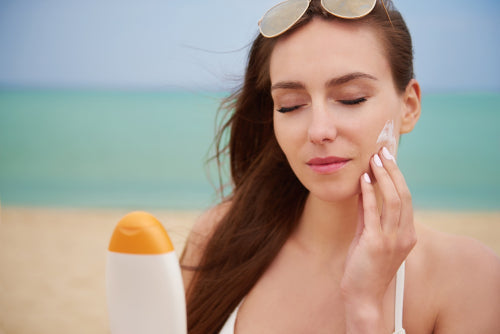Hydrating Your Skin During Hot, Dry Weather

Quick Listen:
Hot, dry weather can be a challenge for your skin. With rising temperatures and arid conditions, your skin often loses moisture more rapidly, leading to dehydration, irritation, and even long-term damage if not properly cared for. Maintaining healthy, hydrated skin during such weather is essential for its overall appearance and health. In this blog, we'll explore essential skincare practices that help to lock in moisture and protect your skin during hot, dry conditions.
The Importance of Skin Hydration
Your skin is your body's first line of defense against the external environment, but it also relies on a balanced level of hydration to maintain its health and function. Hydrated skin not only looks more youthful and radiant but also helps to keep out harmful pollutants, allergens, and bacteria.
Hot and dry conditions can accelerate moisture loss, leaving the skin vulnerable to dryness, cracking, and irritation. This is particularly concerning for individuals with sensitive skin, eczema, or other skin conditions, as they may experience heightened symptoms during these weather conditions.
In hot weather, several factors contribute to the depletion of your skin's moisture levels:
- Increased sweat: As temperatures rise, your body sweats to cool off. While sweat is meant to help regulate body temperature, it also causes the skin to lose moisture, leaving it feeling dry and tight.
- Low humidity: Dry, arid air pulls moisture out of your skin, leaving it feeling parched. Without the right protective measures, the natural oils and hydration of your skin are compromised.
- Harsh UV rays: Prolonged sun exposure can damage your skin's outer layer, reducing its ability to retain moisture. UV radiation breaks down collagen and elastin, leading to dryness and premature aging.
To combat these issues, hydration should be a priority in your skincare routine.
Hydrating Your Skin: Key Steps
1. Use Hydrating Moisturizers
A good moisturizer is your skin's best friend, especially during hot and dry weather. Look for products that contain humectants like glycerin, hyaluronic acid, and aloe vera. These ingredients draw moisture from the air into your skin and help it maintain hydration throughout the day.
When choosing a moisturizer, opt for one that is lightweight but still nourishing. If you have oily skin, gel-based moisturizers may work better for you, as they hydrate without making your skin feel greasy. For those with dry skin, choose thicker, cream-based moisturizers that provide more intense hydration.
To maximize the benefits, apply your moisturizer while your skin is still slightly damp after cleansing. This helps lock in moisture more effectively.
2. Incorporate Hydrating Serums and Oils
Serums are lightweight and packed with active ingredients that penetrate deeper into the skin than traditional moisturizers. Choose serums with ingredients like hyaluronic acid, vitamin E, and vitamin C to provide an additional layer of hydration and skin protection.
Facial oils can also be beneficial in retaining moisture, especially for people with dry skin. Oils like argan, jojoba, and rosehip oil nourish the skin and restore its natural moisture balance, creating a protective barrier against harsh environmental conditions.
3. Use Hydrating Masks
Face masks can provide an extra boost of hydration to your skin, particularly after a long day in the sun. Look for masks that contain ingredients like hyaluronic acid, glycerin, aloe vera, and vitamin E. These ingredients will provide deep hydration, leaving your skin feeling refreshed and rejuvenated.
Sheet masks are particularly useful during hot, dry weather. They help lock in moisture and provide cooling relief to sun-drenched skin. You can also try hydrating overnight masks for a more intense treatment, as they work while you sleep and leave you with plump, well-hydrated skin when you wake up.
4. Use Sunscreen Regularly
While hydration is essential, it's equally important to protect your skin from the sun's harmful UV rays. Sunscreen acts as a barrier between your skin and UV radiation, preventing damage that can result in dryness, sunburn, and premature aging.
Choose a sunscreen with at least SPF 30 and ensure it is broad-spectrum, meaning it protects against both UVA and UVB rays. If you're spending extended time outdoors, make sure to reapply sunscreen every two hours and after swimming or sweating.
Opt for sunscreens that contain moisturizing ingredients like glycerin or aloe vera to help hydrate the skin while providing sun protection. This double-duty product is perfect for dry climates.
5. Drink Plenty of Water
External hydration is important, but don't overlook the power of hydration from within. Drinking plenty of water throughout the day helps replenish moisture levels in your skin and supports its natural functions. When you're exposed to hot, dry conditions, it's even more important to stay hydrated by drinking water regularly.
In addition to water, you can incorporate hydrating foods into your diet, such as cucumbers, watermelons, celery, and oranges, which have high water content and can help keep your skin hydrated.
6. Avoid Harsh Ingredients
Certain skincare products and ingredients can strip your skin of its natural moisture, leaving it more prone to dryness. During hot, dry weather, avoid products that contain alcohol, fragrance, sulfates, and strong exfoliants, as they can dehydrate and irritate the skin.
Instead, opt for gentle cleansers that are free from harsh chemicals and fragrances. Look for products that are labeled as hydrating or moisturizing to ensure they support your skin's moisture retention.
7. Modify Your Skincare Routine
If your skin becomes irritated or parched during hot, dry weather, consider adjusting your skincare routine. You may need to cleanse your skin less often, as over-cleansing can lead to moisture loss. Instead, try a gentle, hydrating cleanser that won't strip your skin's natural oils.
Also, be sure to tone with alcohol-free toners that add an extra layer of hydration. Following up with a hydrating serum and moisturizer is essential to lock in moisture and soothe your skin.
Tips for Specific Skin Types
Oily skin: Oily skin still needs hydration, but you should opt for lightweight, gel-based products that won't clog pores. Look for oil-free moisturizers and non-comedogenic sunscreens.
Dry skin: Dry skin requires richer, thicker creams and oils to maintain hydration. Avoid harsh cleansers, and consider using a humidifier at home to add moisture to the air.
Sensitive skin: Stick to fragrance-free, hypoallergenic products that provide gentle hydration. Always patch-test new products to ensure they won't irritate your skin.
Hydrate Your Skin
Hydrating your skin during hot, dry weather is essential to maintaining its health and appearance. By using the right moisturizing products, protecting your skin from the sun, staying hydrated internally, and avoiding harsh ingredients, you can ensure your skin stays soft, nourished, and well-protected even in the hottest conditions.
Remember that skincare is personal, so experiment with different products and routines to find what works best for your skin type. With consistent care, your skin can thrive despite the harsh, dry weather.
You may also be interested in: Duo Smooth and Stellar Desavery
Tired of putting harsh chemicals and synthetic ingredients in your skin? Discover the gentle, plant-powered, and cruelty-free skincare routine from Desavery. Meticulously crafted for every skin type, our day-and-night formulas nourish and revitalize, giving your skin a healthy, radiant glow. Join the community of those who've found a natural, effective solution for their skincare needs. Let your glowy skin tell a story of health and natural beauty. Shop Desavery Now!
Powered by flareAI



